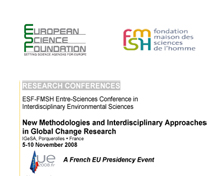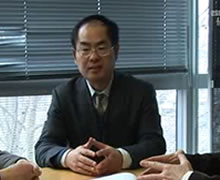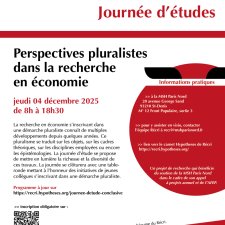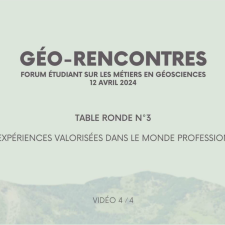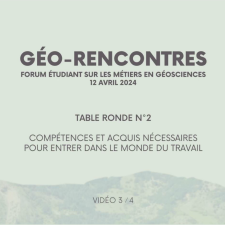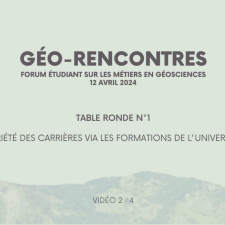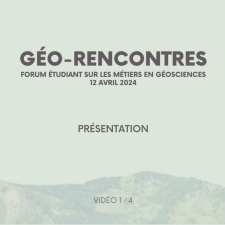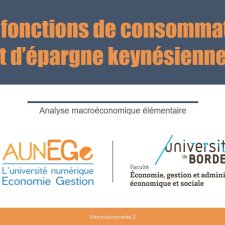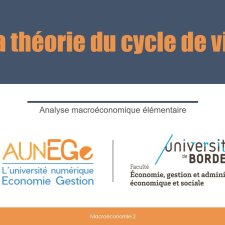Notice
Debate
- document 1 document 2 document 3
- niveau 1 niveau 2 niveau 3
Descriptif
The European Science Foundation (ESF) and the French Foundation of the Maison des Sciences de l’Homme (FMSH) (within the Entre-Sciences programme) have agreed to jointly develop a new conference series in environmental sciences; an effort to actively foster exchanges between scientists working in the humanities and social sciences and their colleagues in the life and natural sciences.
This interdisciplinary conference present the new advances in the modelling of the Global Change that combines Geosciences and Economics, with a perspective view from history - given the novelty of their interrelations – and from political science – given the impact of the model outputs in the public sphere. The conference gather together speakers and attendees from Europe, United States and Asia.
The conference focuses on new advances in the construction of models of the global change, in Earth sciences and in Economics. Given the issues at stake with Global Warning in terms of impacts and risks, these multidisciplinary approaches are necessarily placed in a public policy perspective, a case apparently unique in the history of science. Chaired by Joël Guiot, climatologist at the European Centre for the Research and Teaching of the Geosciences of the Environment (CEREGE, Aix-en-Provence) and Sylvie Thoron, economist at the Aix-Marseille Research Group in Quantitative Economy (GREQAM, Marseille), the conference aims at generating intense discussions between scientists coming from various disciplinary horizons, by emphasizing the need for integrative approaches when thinking of our future in terms of sustainable development.
>> More information on the web site site web Entre-Sciences Programme.
Intervention / Responsable scientifique
Dans la même collection
-
Conference Opening
GuiotJoëlLauberVolkmarThe European Science Foundation (ESF) and the French Foundation of the Maison des Sciences de l’Homme (FMSH) (within the Entre-Sciences programme) have agreed to jointly develop a new conference
-
From Climate Models to Earth System Models
BrasseurGuyComplex climate models that describe the evolution of the coupled ocean atmosphere cryosphere system are gradually extended to “non physical” components of the earth system, and account for land
-
Are European Ecosystems Vulnerable to Climate Change
CramerWolfgangThe relatively simple question posed by this title turns out to be complicated in its implementation, for a number of reasons: First, ecosystems have changed in response to changing climate throughout
-
The Impacts of Climate Change on Continental Ecosystems
SeguinBernardClimate change will deeply modify the ecophysiological functioningof plants, by creating a set of conditions which could be more favourable (in the sense of biomass production) or not. Among the first
-
The Economics of the Climate/Development of the Gordian Knot; Beyond a Sound Pessimism
HourcadeJean-CharlesWe will first suggest that costs of meeting ambitious climate targets capable to stabilize global warming below 2°C or 3°C temperature increase have been underestimated so far. The first reason is the
-
Carbon Offsetting: An Ethical and Psychological Approach
FragnièreAugustinThe carbon offset market is becoming more and more popular. However, 57 until now few studies have attempted to approach the phenomenon from a social sciences’ perspective. By distinguishing three
-
The Post-Kyoto
DuvalRomainThe European Science Foundation (ESF) and the French Foundation of the Maison des Sciences de l’Homme (FMSH) (within the Entre-Sciences programme) have agreed to jointly develop a new conference
-
Long Term Climate Variability: from Past to Future and from Data to Models
GuiotJoëlData show that climate has always changed in the past, sometimes with a larger amplitude than what we experimented for two decades. But the main signatures of the anthopogenic forcing are the speed of
-
Detection and Attribution of Climate Change to Different Causes
PlantonSergeAccording to the last IPCC report, the most part of the observed increase in globally averaged temperatures since the mid-20th century is very likely due to the observed increase in anthropogenic
-
Setting Cumulative Emissions Targets to Reduce the Risk of "Dangerous" Climate Change
ZickfeldKirstenThe ultimate objective of climate change mitigation is to reduce the amount of anthropogenic greenhouse gas (GHG) emissions in order to achieve “stabilization of greenhouse gas concentrations in the
-
Debate
CiaisPhilippeSeguinBernardChauvinDominiqueThe European Science Foundation (ESF) and the French Foundation of the Maison des Sciences de l’Homme (FMSH) (within the Entre-Sciences programme) have agreed to jointly develop a new conference
-
The Intergovernmental Panel on Climate Change and the Challenges of Climate policy, Equity and Ethi…
SomervilleRichardThe 2007 Intergovernmental Panel on Climate Change (IPCC) report provides clear guidance for the greenhouse gas emissions reductions needed to limit global warming to specific targets such as 2 °C
Avec les mêmes intervenants et intervenantes
-
Accueil et table ronde 1 | Croissance et régulation économique et sociale, écodéveloppement
RacineJean-LucCohenAntoninAymardMauricePottierAntoninBoyerRobertHourcadeJean-CharlesLa RovereEmilio LèbreGarciaAfrânioRivronVassiliRendre hommage à Ignacy Sachs (1927-2023), c’est saluer le parcours visionnaire du théoricien de l’écodéveloppement qui, dès les années 1970, pose les bases d’un équilibre à atteindre entre croissance
-
The Post-Kyoto
DuvalRomainThe European Science Foundation (ESF) and the French Foundation of the Maison des Sciences de l’Homme (FMSH) (within the Entre-Sciences programme) have agreed to jointly develop a new conference
-
The Intergovernmental Panel on Climate Change and the Challenges of Climate policy, Equity and Ethi…
SomervilleRichardThe 2007 Intergovernmental Panel on Climate Change (IPCC) report provides clear guidance for the greenhouse gas emissions reductions needed to limit global warming to specific targets such as 2 °C
-
Interlocking Natural and Social Systems - Resilience, Governance and Research Policy Considerations
SvedinUnoIn this presentation the start is made from the 2007 IPCC statement that it now seems consolidated that there is a clear sign of the importance of the anthropogenic factors in the climate change
-
The Economics of the Climate/Development of the Gordian Knot; Beyond a Sound Pessimism
HourcadeJean-CharlesWe will first suggest that costs of meeting ambitious climate targets capable to stabilize global warming below 2°C or 3°C temperature increase have been underestimated so far. The first reason is the
-
IPCC Working Group I
SomervilleRichardThe European Science Foundation (ESF) and the French Foundation of the Maison des Sciences de l’Homme (FMSH) (within the Entre-Sciences programme) have agreed to jointly develop a new conference
-
Post-2012 options to Reduce Greenhouse Gas Emissions
DuvalRomainThe presentation will focus on post-2012 options to reduce greenhouse gas (GHG) emissions, putting special emphasis on the need to abate world emissions. The presentation will focus on post-2012
-
Round Table
JoussaumeSylvieChanzyAndréSomervilleRichardDuvalRomainThe European Science Foundation (ESF) and the French Foundation of the Maison des Sciences de l’Homme (FMSH) (within the Entre-Sciences programme) have agreed to jointly develop a new conference
-
Risques, expertise et politiques
ArmatteMichelDahanAmyCouvetDenisHourcadeJean-CharlesRotaruMonicaEn réunissant des scientifiques, des experts du Groupe intergouvernemental d'étude du climat (GIEC), des représentants d'administrations et d'institutions de diffusion de (information scientifique, le
Sur le même thème
-
Journée d’étude | Récri : Perspectives pluralistes dans la recherche en économie - PARTIE 1
MofakhamiMaloMéryFlorianAu cours de ces bientôt deux ans de séminaire, les séances mensuelles du Récri ont été l’occasion de mettre en évidence la diversité et la richesse des recherches en économie menées par des jeunes
-
Journée d’étude | Récri : Perspectives pluralistes dans la recherche en économie - PARTIE 2
TailleurGabrielMalherbeLéoCastelanelliBenjaminRosano-GrangeMarlèneRosElodieGononMorganeTosoliniMarionBétouleAliceGrangerayJonasBouffangeAlbertAu cours de ces bientôt deux ans de séminaire, les séances mensuelles du Récri ont été l’occasion de mettre en évidence la diversité et la richesse des recherches en économie menées par des jeunes
-
Géo-Rencontres 2024 / Les expériences valorisées dans le monde professionnel
LilloEmmaAraujoJulieHuartFlorianDubreuRomainBuquetDamienChazalLauraBorieMarianeForum sur les métiers en géosciences organisé par les étudiants du CMI Ingénierie Géologique et Civile, Université de Bordeaux, 12 avril 2024
-
Géo-Rencontres 2024 / Compétences et acquis nécessaires pour entrer dans le monde du travail
BrinonJulietteAmoleFili-FenuaPretouFrédéricCampetHugoLiébauxAlbinDe AlemeidaMarie-LouPoirierAymericDufrenoyAudreyForum sur les métiers en géosciences organisé par les étudiants du CMI Ingénierie Géologique et Civile, Université de Bordeaux, 12 avril 2024
-
Géo-Rencontres 2024 / Variété des carrières via les formations de l'université
InguimbertDianeLacazeRomaneLemaitreLaurieChazalLauraMontjeanPascalPoudevigneJacquesPortefaixFrédéricForum sur les métiers en géosciences organisé par les étudiants du CMI Ingénierie Géologique et Civile, Université de Bordeaux, 12 avril 2024
-
Géo-Rencontres 2024 / Présentation
LatasteJean-FrançoisLavieThéoForum sur les métiers en géosciences organisé par les étudiants du CMI Ingénierie Géologique et Civile, Université de Bordeaux, 12 avril 2024
-
Tokyo, plus grande « ville » au monde : aménager et gouverner la démesure
Languillon-AusselRaphaëlAvec ses quelques trente-cinq millions d’habitants, Tokyo est la « ville » la plus peuplée au monde, et l’une des métropoles les plus riches. Cette présentation vise à décrire, analyser et expliquer,
-
Les fonctions de consommation et d’épargne keynésiennes
Maveyraud-TricoireSamuelLes fonctions de consommation et d’épargne keynésiennes
-
La détermination du PIB à court terme
Maveyraud-TricoireSamuelLa détermination du PIB à court terme
-
Demande en biens et services et fluctuations conjoncturelles
Maveyraud-TricoireSamuelDemande en biens et services et fluctuations conjoncturelles
-
-


